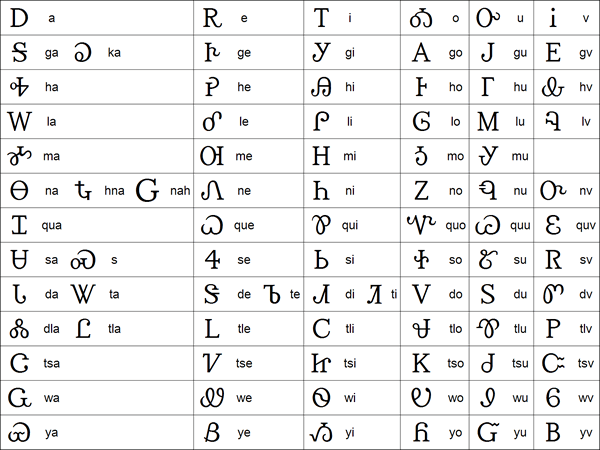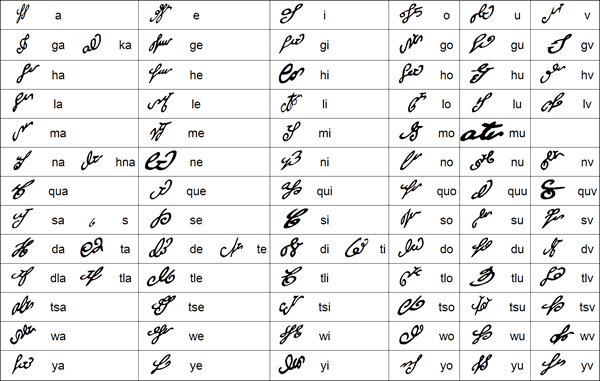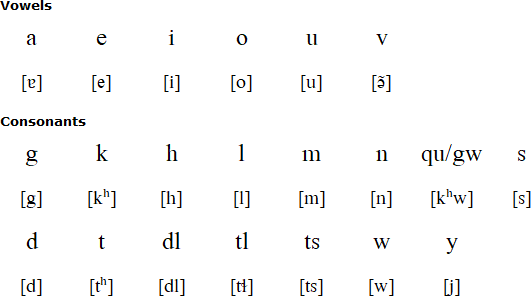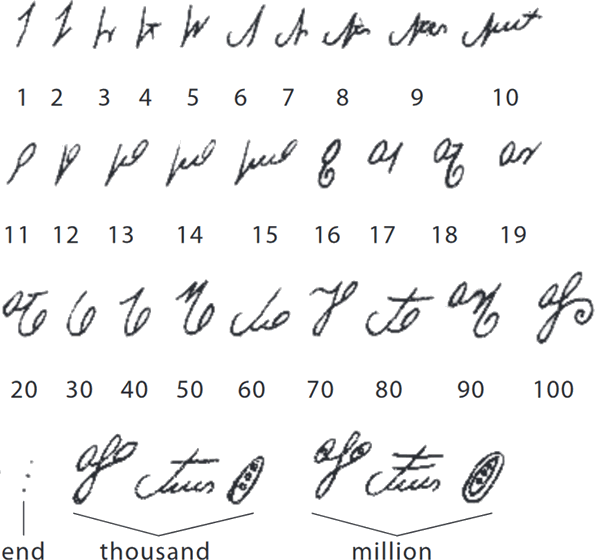Cherokee is a Southern Iroquoian language spoken mainly in North Carolina (Tetsas / ᏖᏣᏍ) and Oklahoma (Asgaya gigageyi / ᎠᏍᎦᏯ ᎩᎦᎨᏱ) and Arkansas (Geiyi / ᎨᎢᏱ) in the USA. Between 1,500 and 2,100 people speak Cherokee, and the majority are over 40 years old. Few children are growing up with the language [source].
According to the 2018 Cherokee Nation Tribal Survey there are 1,200 speakers of Cherokee in the Cherokee Nation in Oklahoma, 217 speakers in the Eastern Band of Cherokees in North Carolina, and 101 speakers in the United Keetoowah Band of Oklahoma and Arkansas [source].
The Cherokee call their language Tsalagi (ᏣᎳᎩ) or Tslagi, and themselves Aniyunwiya (ᎠᏂᏴᏫᏯ) ("Principal People"). Speakers of the Eastern of Lower dialect of Cherokee called the language jaragi, which might be the origin of the name Cherokee.
Alternatively, the name Cherokee may come from the Choctaw word Cha-la-kee ("those who live in the mountains") or Chi-luk-ik-bi ("those who live in the cave country"), or from Cvlakke, which means “someone who speaks another language” in a Lower Creek. It first appeared as Chalaque in Portuguese in 1557, then Cheraqui in French in 1699, and Cherokee in English from about 1708.
There are two main dialects of Cherokee. The Eastern dialect is spoken in the Qualla Boundary or The Qualla, an area of western North Carolina purchashed by the Cherokee tribe in the 1870s. It is also known Middle or Kituwa (ᎩᏚᏩ) dialect. The Western dialect is spoken in eastern Oklahoma and North Carolina. It is also known as the Overhill or Otali dialect. Until about 1900, the Southern or Lower dialect of Cherokee was also spoken in South Carolina and Georgia.
Cherokee is well documented, with more literature than any other Native American language. There are Cherokee dictionaries and grammars, translations of parts of the Bible, and a Cherokee newspaper.
The Cherokee Nation has a plan, instigated in 2008, to increase the number of fluent speakers through immersion programs in schools, and encouraging people to speak Cherokee at home. In 50 years their goal is for 80% or more of the Cherokee people to speak their language fluently. Parents are taught the language along with their children, and it is possible to study Cherokee at a number of universities in Oklahoma and North Carolina.
The Cherokee syllabary was invented by George Guess/Gist, a.k.a. Chief Sequoyah (ᏍᏏᏉᏯ / ᏎᏉᏯ), of the Cherokee, and was developed between 1809 and 1824. At first Sequoyah experimented with a writing system based on logograms, but found this cumbersome and unsuitable for Cherokee. He later developed a syllabary which was originally cursive and hand-written, but it was too difficult and expensive to produce a printed version, so he devised a new version with symbols based on letters from the Latin alphabet and Western numerals.
Sequoyah's descendants claim that he was the last surviving member of his tribe's scribe clan and the Cherokee syllabary was invented by persons unknown at a much earlier date.
By 1820 thousands of Cherokees had learnt the syllabary, and by 1830, 90% were literate in their own language. Books, religious texts, almanacs and newspapers were all published using the syllabary, which was widely used for over 100 years.
Today the syllabary is still used; efforts are being made to revive both the Cherokee language and the Cherokee syllabary, and Cherokee courses are offered at a number of schools, colleges and universities.


Source: http://intertribal.net/NAT/Cherokee/WebPgCC1/Original.htm

You can hear the sounds of Cherokee at:
http://www.cherokee.org/Extras/Downloads/syllabary.html
Download a Cherokee script chart (Excel)
Sequoyah designed numerals for his script, however the Cherokee council voted not to adopt them.

Source:http://www.tiro.com/syllabics/Cherokee/Giasson_ChrkSyll.pdf


Nigada aniyvwi nigegudalvna ale unitloyi unadehna duyugadv gesvi. Getsinela unadanvtedi ale unotlisadi ale squu gesv tsunilvwisdanedi anatlinvtlv adanvdo gvdi.
All human beings are born free and equal in dignity and rights. They are endowed with reason and conscience and should act towards one another in a spirit of brotherhood.
(Article 1 of the Universal Declaration of Human Rights)
Information about Cherokee | Phrases | Numbers | Cherokee courses on: Amazon.com and Amazon.co.uk [affilate links]
Information about Cherokee
https://language.cherokee.org/
https://en.wikipedia.org/wiki/Cherokee_language
https://en.wikipedia.org/wiki/History_of_the_Cherokee_language
http://www.native-languages.org/cherokee.htm
Information about Sequoyah
https://en.wikipedia.org/wiki/Sequoyah
https://en.wikipedia.org/wiki/Sequoyah
https://education.nationalgeographic.org/resource/sequoyah-and-creation-cherokee-syllabary/
cher
https://www.cherokeephoenix.org/culture/sequoyah-inventor-of-cherokee-syllabary/article_a83c9cc8-1f25-11ed-9329-d3f5b1d9924b.html
http://www.sequoyahmuseum.org
Online Cherokee lessons
https://learn.cherokee.org/
http://www.culturev.com/cherokee/cherokee.html
http://tsasuyed.blogspot.com
https://jalagigawoni.gnomio.com
https://cherokeespeaks.com/
https://www.yourgrandmotherscherokee.com/online-language-classes
Online Cherokee dictionaries
http://www.manataka.org/page122.html
http://www.cherokeedictionary.net
Phrases in Cherokee
https://cherokeespeaks.com/language/#beginner
https://thetalklist.com/cherokee-language-words/
Numbers in Cherokee
http://www.languagesandnumbers.com/how-to-count-in-cherokee/en/chr/
https://thetalklist.com/numbers-in-the-cherokee-language/
http://www.native-languages.org/numbers/cherokee_numbers.htm
https://shiyo.org/numbers
Cherokee fonts
https://language.cherokee.org/fonts-and-keyboards/cherokee-fonts/
http://www.wazu.jp/gallery/Fonts_Cherokee.html
https://fonts.google.com/noto/specimen/Noto+Sans+Cherokee
https://www.languagegeek.com/font/fontdownload.html#Cherokee
https://app.box.com/s/tbywl8spne7je9hf8s6n0p1qxsr0yy4t
Cherokee transliteration system
http://www.translitteration.com/transliteration/en/cherokee/sequoyah/
Cherokee Observer - online Cherokee newspaper
http://www.cherokeeobserver.org
Place names of Cherokee origin
http://chenocetah.wordpress.com
Cayuga, Cherokee, Mohawk, Oneida, Onondaga, Seneca, Tuscarora, Wendat
Afaka, Bamum, Caroline Island Script, Celtiberian, Cherokee, Cypriot, Dunging (Iban), Eskayan, Hiragana, Iberian, Katakana, Kpelle, Loma, Mende (Kikakui), Mwangwego, Nüshu, Nwagụ Aneke, Vai, Yi, Yugtun
Page last modified: 18.01.25
[top]
You can support this site by Buying Me A Coffee, and if you like what you see on this page, you can use the buttons below to share it with people you know.

If you like this site and find it useful, you can support it by making a donation via PayPal or Patreon, or by contributing in other ways. Omniglot is how I make my living.
Note: all links on this site to Amazon.com, Amazon.co.uk
and Amazon.fr
are affiliate links. This means I earn a commission if you click on any of them and buy something. So by clicking on these links you can help to support this site.
[top]